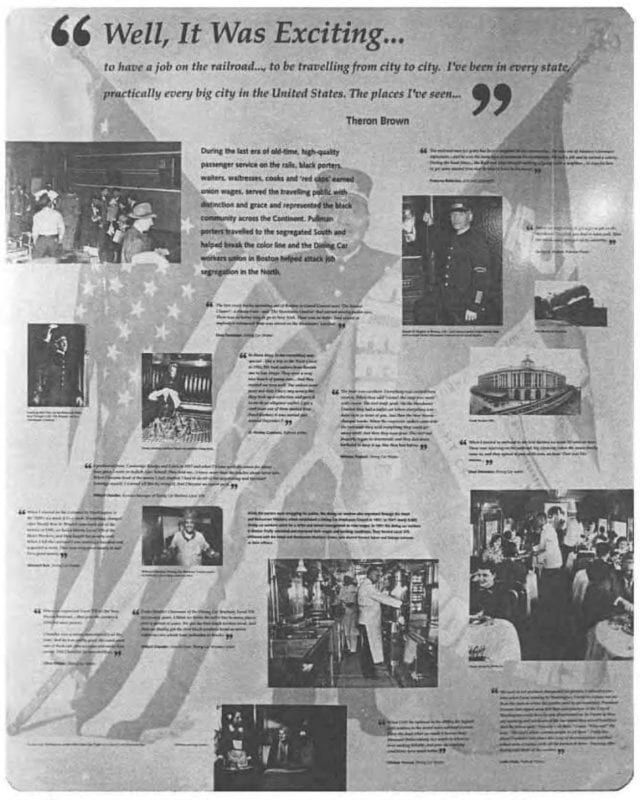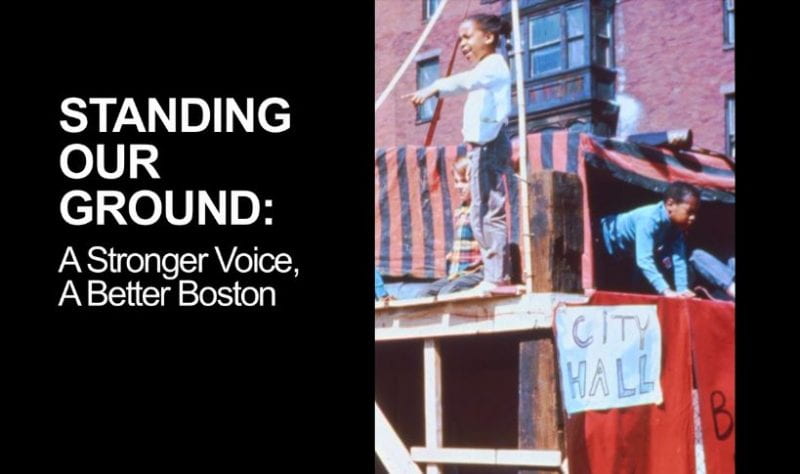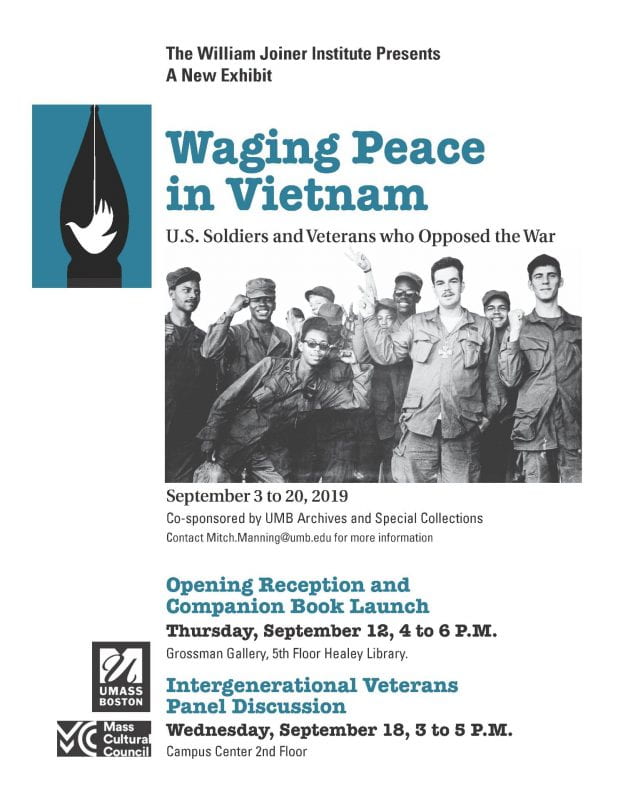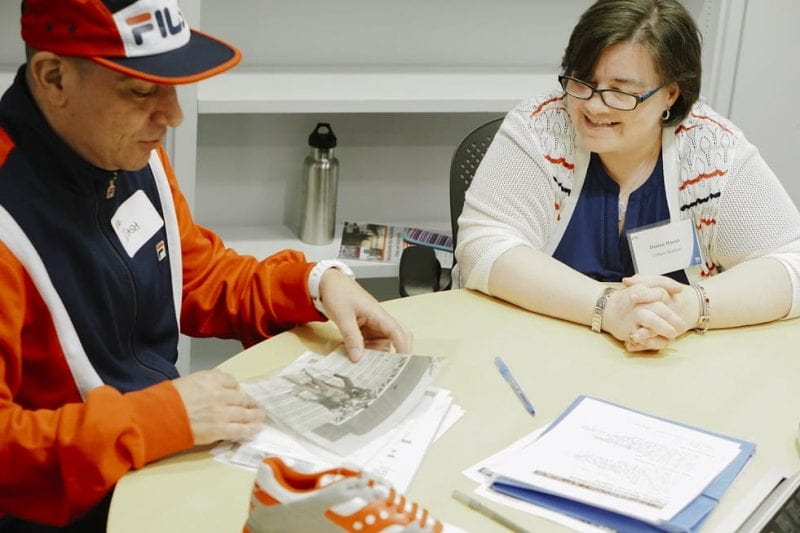
A page from the “Knights of the Rail” exhibit guide, which tells the history leading up to the formation of the Brotherhood of Sleeping Car Porters.
Author: Shay Park, Archives Assistant
At Boston’s Back Bay Station, there is a statue and a permanent exhibit commemorating civil rights and labor organizer A. Philip Randolph. Randolph’s activism began in the early twentieth century and continued through the Civil Rights Era. Notably, he was a co-organizer of the March on Washington on August 23, 1963, one of the largest political rallies in history. He also organized the Brotherhood of Sleeping Car Porters, a union for railroad porters of the Pullman Car Company, in 1925. The Brotherhood’s Boston members are the focus of the Back Bay exhibit, titled “Knights of the Rail.” The exhibit takes the form of six porcelain panels mounted on walls inside the station.
Within our Special Collections are the exhibit guide and transcripts of interviews of retired Pullman employees and former Brotherhood members. Browse digitized copies of those materials and the finding aid for the collection. The interviews were conducted by historian Robert C. Hayden as part of the research process for the exhibit. The guide contains reproductions of each of the panels, as well as text written by the late historian and labor activist Dr. Jim Green that recounts the history of the Pullman porters leading up to the formation of the Brotherhood and the gains they made under Randolph’s leadership.
Though the statue, exhibit, and exhibit guide highlight the immense contributions of A. Philip Randolph through the Brotherhood, the interviews also provide rich insight into the lives of the railroad workers. Following the Civil War, there was a mass migration of newly freed Black Americans to northern cities. Job prospects were limited due to segregation and racism, which meant that the Black workforce quickly became one that was easily exploited as cheap labor, and Black workers were forced into a finite range of job positions.
The Pullman Car Company, which had a virtual monopoly on the manufacture and operation of sleeper rail cars, took advantage of these circumstances by hiring an almost exclusively Black staff, from cooks to waiters to cleaners to porters. Wages were low and working conditions were poor, but it presented an opportunity to make a living for many who had few other choices. By the 1920s, the Pullman Company was the largest employer of Black labor in the United States.
Pullman porters made multiple failed attempts to organize before approaching A. Philip Randolph for his help. Under his leadership, the Brotherhood finally formed, with demands such as a 240-hour work month and a minimum monthly wage of $150. However, it wasn’t until more than a decade later in 1937 that the Pullman Company recognized the Brotherhood after a long battle attempting to bust the union. Randolph successfully negotiated many of their demands, and their victory made them the first national Black union to bargain effectively with a major company.

The “Knights of the Rail” exhibit guide contains reproductions of the panels mounted at Back Bay Station. Each panel includes photographs and quotes from the interviews conducted by historian Robert C. Hayden.
The interviews showcase the variety of jobs employees on Pullman cars held. While the Brotherhood unionized the Pullman porters, there were other workers such as those in the dining cars who were not organized until later. The interviews provide details of daily life on the railroads, experienced through long hours on trips that took them away from home. Many appreciated the opportunity to travel and the steady job, while lamenting the fact that supporting their loved ones meant spending long periods of time away. Some recounted kind or reasonable supervisors, though they still experienced discrimination—if not from their employers then from the patrons they served. Others described the frequent lack of formal training, with some learning on the job with little to no former experience, whether it was as a cook or as an engine repair person. Overall, in spite of grievances or hardships, most stated that they enjoyed their jobs.
Along with diversity in job types, the workers themselves had diverse life experiences. The majority of the workers interviewed moved to the Boston area from Southern states, but Fidel S. Barboza, who worked first as a cook and then as a porter until he was laid off in 1957, was an immigrant from Mexico. Though he struggled because he did not speak English at first, he was considered a good worker and promoted several times. Frances E. Rideout, one of two women interviewed, described her time as a waitress. When she began working in the 1930s, it was rare for a woman to work on railroads, but over the course of her nearly four decades on Pullman cars, she did experience working with an all-woman crew.
Interviewer Robert C. Hayden and Dr. Jim Green, author of the exhibit guide, wrote in a joint article about the interviews that they “show that Randolph’s movement was composed of rank-and-file workers of many political persuasions, people who also deserve recognition.” They foreground the individual lives of those for whom the Brotherhood and later union organizations advocated. It provides these workers the ability to tell their own stories and ensure their personal experiences are included in the history of the larger movement.
Those who are interested in other relevant holdings in our University Archives and Special Collection may consult the James Green papers. Dr. Green taught history and labor studies at the University of Massachusetts Boston, creating and then directing its Public History graduate program. His papers cover nearly fifty years of research and activism among other kinds of materials and activities. Dr. Green also provided a video interview for the UMass Boston Mass. Memories Road Show on May 2, 2014, describing the activism he took part in on UMass Boston’s campus over the years.
References and further reading
“Pullman Porters Helped Build Black Middle Class.” NPR, 7 May 2009, www.npr.org/templates/story/story.php?storyId=103880184.
Green, James R. and Robert C. Hayden. “A. Philip Randolph and Boston’s African-American Railroad Worker.” Trotter Review, vol. 6, no. 2, 1992, 20-23. Internet Archive. Web. https://archive.org/details/trotterreview62willi/page/20/mode/2up.
McWatt, Arthur C. “‘A Greater Victory’: The Brotherhood of Sleeping Car Porters in St. Paul.” Minnesota History, vol. 55, no. 5, 1997, 202–216.






